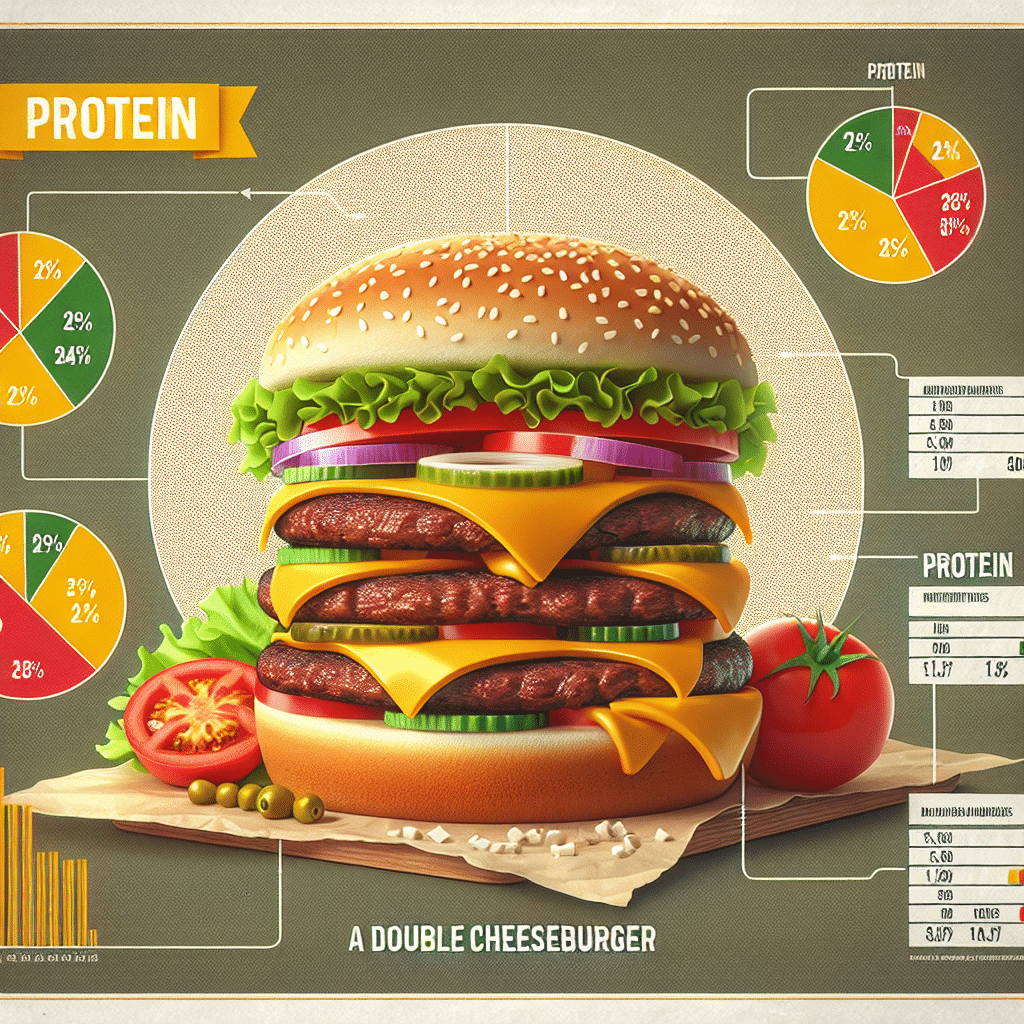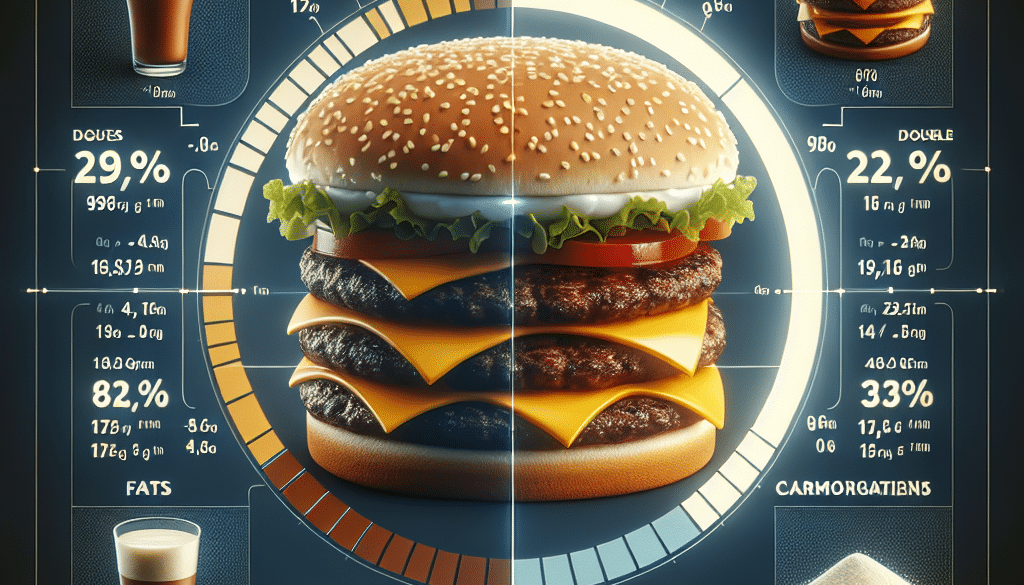How Much Protein in a Double Cheeseburger: Fast Food Nutritional Facts
-
Table of Contents
- Protein Content in Double Cheeseburgers: Unveiling Fast Food Nutritional Facts
- Understanding Protein in Fast Food Double Cheeseburgers
- Comparing Nutritional Profiles of Popular Double Cheeseburgers
- Health Considerations When Eating Double Cheeseburgers
- Case Studies: The Impact of Fast Food Protein on Diet
- Strategies for Healthier Fast Food Choices
- Conclusion: Balancing Protein Intake with Nutritional Awareness
- Discover ETprotein’s High-Quality Protein Products
Protein Content in Double Cheeseburgers: Unveiling Fast Food Nutritional Facts

When it comes to fast food, double cheeseburgers are among the most popular choices for a quick and satisfying meal. However, with the rising awareness of nutritional health, many consumers are now more interested in understanding what exactly they are consuming. One of the key nutritional components that people are particularly curious about is the protein content in these meaty sandwiches. This article delves into the protein content of double cheeseburgers from various fast food chains, as well as other nutritional facts that are essential for making informed dietary choices.
Understanding Protein in Fast Food Double Cheeseburgers
Protein is a vital macronutrient necessary for building and repairing tissues, making enzymes and hormones, and supporting overall health. Double cheeseburgers, with their two patties and slices of cheese, are often seen as a significant source of protein. But how much protein are you really getting?
- McDonald’s Double Cheeseburger: Typically contains around 25 grams of protein.
- Burger King Double Cheeseburger: Offers approximately 28 grams of protein.
- Wendy’s Double Stack: Comes with about 20 grams of protein.
These figures can vary based on the specific recipe and serving size of the burger. It’s also important to note that while these burgers provide a good amount of protein, they also come with high levels of saturated fats, sodium, and calories, which can impact your health if consumed in excess.
Comparing Nutritional Profiles of Popular Double Cheeseburgers
Let’s take a closer look at the nutritional profiles of double cheeseburgers from some of the leading fast food chains:
- Calories: Ranging from 450 to 700 calories, depending on the size and ingredients.
- Fat: These burgers can contain between 20 to 40 grams of fat, with a significant portion being saturated fat.
- Carbohydrates: Typically, a double cheeseburger will have 30 to 50 grams of carbohydrates, largely from the bun and condiments.
- Sodium: Fast food burgers are known for their high sodium content, often exceeding 1000 mg, which is a substantial portion of the recommended daily intake.
While the protein content is a positive aspect of these burgers, balancing your diet with other nutrient-rich foods is crucial to maintain good health.
Health Considerations When Eating Double Cheeseburgers
Consuming double cheeseburgers can have various health implications:
- Heart Health: High saturated fat and sodium levels can contribute to heart disease and high blood pressure.
- Weight Management: The calorie-dense nature of these burgers can lead to weight gain if not balanced with physical activity.
- Nutrient Intake: While high in protein, these burgers often lack essential nutrients found in vegetables, fruits, and whole grains.
It’s important to enjoy double cheeseburgers in moderation and as part of a balanced diet that includes a variety of foods.
Case Studies: The Impact of Fast Food Protein on Diet
Several studies have examined the role of fast food protein in our diets. For instance, research has shown that while fast food can be a quick source of protein, it often comes with excess calories and unhealthy fats that can negate the benefits of protein. Another study highlighted that frequent consumption of fast food is linked to poorer diet quality and higher obesity rates.
Strategies for Healthier Fast Food Choices
To make healthier choices when opting for fast food, consider the following tips:
- Go for Grilled Options: Choose grilled chicken sandwiches or burgers, which are typically lower in calories and fat.
- Customize Your Order: Ask for less cheese, no mayonnaise, and additional vegetables to reduce fat and add nutrients.
- Watch Portion Sizes: Opt for single patty burgers or junior sizes to keep calorie and fat intake in check.
- Balance Your Meal: Pair your burger with a side salad instead of fries to increase your intake of vegetables.
Conclusion: Balancing Protein Intake with Nutritional Awareness
In conclusion, while double cheeseburgers from fast food chains can be a substantial source of protein, it’s essential to consider the entire nutritional profile of these meals. High levels of saturated fats, calories, and sodium can have adverse health effects, especially when consumed frequently. By making informed choices and enjoying these burgers in moderation, you can include them as part of a balanced diet that supports your health and well-being.
Discover ETprotein’s High-Quality Protein Products
If you’re looking for alternative sources of protein to complement your diet, ETprotein offers a range of plant-based protein products that can serve as nutritious additions to your meals. Their organic and non-GMO protein powders, including rice, pea, and pumpkin seed proteins, provide a clean and allergen-free option for those seeking to increase their protein intake without the added fats and calories found in fast food.
Whether you’re involved in sports nutrition, weight management, or simply looking to enhance your overall health, ETprotein’s products cater to a variety of needs. By incorporating these plant proteins into your diet, you can enjoy the benefits of protein in a more health-conscious way.
About ETprotein:
ETprotein, a reputable plant protein vegan protein Chinese factory manufacturer and supplier, is renowned for producing, stocking, exporting, and delivering the highest quality organic bulk vegan protein and plant proteins. They include Organic rice protein, clear rice protein, pea protein, clear pea protein, watermelon seed protein, pumpkin seed protein, sunflower seed protein, mung bean protein, peanut protein etc. Their offerings, characterized by a neutral taste, non-GMO, allergen-free attributes, cater to a diverse range of industries. They serve nutraceutical, pharmaceutical, cosmeceutical, veterinary, as well as food and beverage finished product distributors, traders, and manufacturers across Europe, USA, Canada, Australia, Thailand, Japan, Korea, Brazil, and Chile, among others.
ETprotein specialization includes exporting and delivering tailor-made protein powder and finished nutritional supplements. Their extensive product range covers sectors like Food and Beverage, Sports Nutrition, Weight Management, Dietary Supplements, Health and Wellness Products, and Infant Formula, ensuring comprehensive solutions to meet all your protein needs.
As a trusted company by leading global food and beverage brands and Fortune 500 companies, ETprotein reinforces China’s reputation in the global arena. For more information or to sample their products, please contact them and email sales(at)ETprotein.com today.












